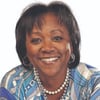ABOUT THE COLUMNIST
Gracie Bonds Staples is an award-winning journalist who has been writing for daily newspapers since 1979, when she graduated from the University of Southern Mississippi. She joined The Atlanta Journal-Constitution in 2000 after stints at the Fort Worth Star-Telegram, the Sacramento Bee, Raleigh Times and two Mississippi dailies. Staples was recently promoted to Senior Features Enterprise Writer. Look for her columns Thursdays and Saturdays in Living and alternating Sundays in Metro.
They lingered over the aroma just for a moment before taking in quick sips spiked with talk about kids, life and church. Heather and Ryan Weaver felt good. The cups of coffee and the hibiscus tea their three children were having were as good as they’d remembered.
But it wasn’t just the warm taste of caffeine or iced tea that delighted them and has kept the Stone Mountain couple coming to this corner of Clarkston every Wednesday. For every beverage they and their children have, a portion of the cost has helped pay the salaries of two community refugees, providing them, well, a resting place.
“We love the cause, the community and the coffee,” said Heather Weaver, a hairdresser and salon owner.
Enjoying a steaming cup of joe in the morning is something of an American tradition, and coffee shops have long served as special gathering places, an excuse to talk, make deals, share stories.
But a coffee truck?
Here at the corner of East Ponce de Leon Avenue and Market Street, yes. And it’s quite good.
Thank Caleb Goodrum and baristas-in-training Leon Shombana and Eleni Tsegu for the cappuccinos and lattes and hibiscus tea that is quickly becoming a favorite. Most especially thank Kitti Murray for the 1986 red Chevy step van that is the Refuge Coffee Co.
Soon after moving here three years ago, Murray couldn’t help but notice the absence of multiethnic coffee shops in her Clarkston neighborhood. She also noticed a big hospitality gap. A coffee shop, she thought, could provide a neutral place for residents to gather and perhaps form friendships and more importantly provide badly needed jobs to the area.
Some 2,500 refugees are settled each year in Clarkston, considered to be "the most diverse square mile in the country." Over half of them fled here from violence. At last count, those refugees represented 145 countries and 761 ethnic groups.
On her daily runs along Market and Church streets, the idea to do something percolated in Murray’s mind. Then during moments of stillness, they poured forth, captivating whoever would listen. She hoped some young hipster, as she put it, would be inspired to do something.
A year and a half ago, Murray, a freelance writer, was sitting with a friend at a Decatur coffee shop of all places.
There will never be anything like this in Clarkston, her friend told her. It wasn’t a complaint. It was an observation.
Murray knew what she meant. She had been talking about the same thing. For months.
Getting nowhere with all that talk, Murray’s husband, Bill, put an end to it. This is your dream, he told her. You do it.
And so in March 2014, the talker set out creating a board of directors, raising money and awareness about the need for jobs, particularly for Clarkston’s ever-growing refugee community.
She had no business acumen. But lucky for us, the 58-year-old grandmother knew what she didn’t know.
She kept talking, putting the word out and on the lookout for someone to fill in the blanks. She hosted neighborhood block parties and a 5K run to raise money for a truck, a large generator, espresso machine and big coffee brewer. She figured she needed a director of operations who would be responsible for training a small staff, refugees in need of jobs.
Murray set up a crowdfunding campaign and raised $50,000, then another $35,000, enough to move from idea to coffee truck, a rarity in metro Atlanta.
Initially, Refuge Coffee, which opened for business just a month ago, limited its business to this corner of Clarkston one day a week. Now it is here 7 a.m.-4 p.m. Wednesdays and Fridays; 8 a.m.-2 p.m. every Tuesday at the Cobb Galleria; and at other times on television and movie sets, private events and weddings.
Murray estimates they serve roughly 100 people a day, many of whom get their cups and sit awhile at shittim wood tables positioned just so underneath one of two tan-colored tents.
“It’s been said that this is the most diverse square mile in the world, but people don’t even know this about Clarkston,” Murray said. “We get to take it on the road and showcase it.”
Particularly the city’s heart.
During a break last Wednesday, Shombana, one of two refugees who are benefiting from this effort, said the coffee shop on wheels has made a world of difference in his life.
When he fled the civil war in the Democratic Republic of Congo 12 years ago, Shombana, 42, said his father and brother had already been killed.
“I knew I was next,” he said.
And so Shombana fled to Swaziland then to Clarkston in 2003.
“I never dreamed I’d find a resting place in a cup of coffee,” he said, laughing, “but that’s what happened.”






